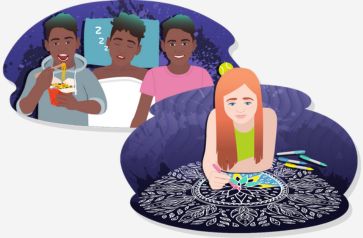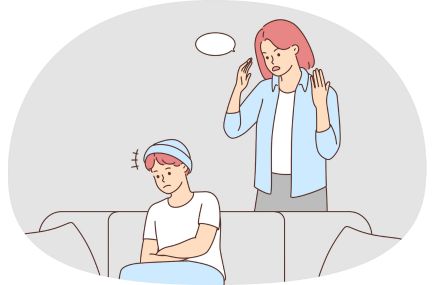Why do I freak out when I’m stressed?
To work out why you're feeling anxious, it can be really helpful ...
READ MEYour guide to puberty, dating, friends, high school and more!
Keep hearing that ‘the teen years are the best years of your life!’ and can’t relate?
We get it. Even though becoming a teenager can be a really exciting time, it can also be filled with anxiety, stress and some pretty major life changes! From body changes (hello, armpit hair) to developing your identity, it can feel like the teenage years are some of the most chaotic yet transformative years of your life.

‘I’m becoming a teen, what can I expect?’
Going from 13 to 19 brings so many changes.
Growth spurts: prepare for the comments from relatives about ‘how tall you’re getting’ or ‘you’ll grow more if you eat your veggies’.
Body shape changes: you’ll start to develop ‘secondary sexual characteristics’ - think hips or shoulders getting wider, needing to wear a bra etc. It's pretty normal to struggle with body image during this time too.
Sleep changes: you might become a bit of a night owl and dread your morning alarm.
Mental health: you might find yourself having mood swings, experiencing anxiety or depression, or suddenly becoming really focused on fitting in (and scared of being judged or rejected).
Hormonal changes: you might start menstruating (getting your periods) or produce hormones like testosterone that makes your external genitals grow.
Appetite and energy changes: feeling hangry (hungry + angry) becomes all too familiar and you find yourself hitting a slump mid afternoon.
‘Liking’ someone... or lots of people: changing relationships – crushes, dating, breakups and pretty big changes to your relationships with family and friends, too.
Body hair: oh, the joys! Say hello to pubic hair, armpit hair, facial hair and surprise hair in other places you might not expect!
‘I don’t know who I am!
How can I figure it out?’
The teen years are great for discovering more about yourself, but the process can seem a little daunting.

When we’re growing up there are so many opportunities to try new things so it’s important not to let expectations of who you feel you ‘should’ be hold you back.
Our biggest advice is to stay true to you! Trends come and go but at the end of the day it’s what you’re doing when you feel like your truest self that really matters.
Our identity is shaped by heaps of factors like our family, culture, school, media, and our mates. This is why it can look so different for everyone!
There’s really no one else like you, so you may as well own it.
Here are our tips to make sure you’re living your most authentic life:
1. Surround yourself with friends that bring you joy, and always have your best interests at heart. If it’s tricky to find a group you mesh well with at school, remember it’s quality over quantity!
Having just one or two people who ‘get’ you is better than a group who you can’t be yourself around.
2. Find hobbies that feel like an outlet for you – whether it be physical or creative. Maybe it’s sport, dance, or video games, the options are endless!
You can always switch it up too; don’t limit yourself.
Spoiler alert: it’s entirely possible to love musical theatre and footy at the same time! You don’t have to fit in a box. Throw the box in the bin!
3. Find ways to express yourself that make you feel good. Whether that be journalling, art, style, music or D&D campaigns! This will help develop your sense of self and develop your identity.
‘I just want to fit in, how do I know if my friendship group is right for me?’
Started high school and noticed that some friendship groups are a little on the exclusive side? More exclusive groups where you must fit a mold to be accepted are called cliques. We suggest you steer clear of these...
‘I found my friends! Now what?’
So, you’ve found some friends that you vibe with and want to start a deep and meaningful convo? Try these questions!
We know that a huge part of being a good friend is supporting your besties through the tricky times. Here are our tips on how to have empathy when you might not ‘get it’
When figuring out who you are and navigating all the joys of becoming a teen, friendship fights can happen. It’s super challenging but we promise it’s completely normal, even if it can feel awkward and uncomfortable.
‘I don’t like what I see in the mirror. How can I love myself more?’
It can feel like intense body changes happen overnight when you’re becoming a teen. Plus, there’s other stuff to deal with, like pimples and body hair. Thanks a lot puberty!
Body image is the way we see, think, feel and behave toward our bodies. So many factors can influence this including what we see on social media, and the way people around us talk about their bodies.

If body image is a concern for you check out our article here.
‘I’m feeling all these feelings and don’t know what to do!’
Puberty doesn’t just trigger physical changes; it triggers mental and emotional changes too.
When we go through puberty our hormones change, which means we might start to feel sadder and more anxious. Mood swings are also super common, although they can be uncomfortable and get us into a bit of hot water with our parents!
Some mood swings are to be expected, but it’s important to know the signs when things might be getting a bit deeper.
Here are some things to look out for:
If you answered yes to these, it’s important to reach out to a trustworthy adult for support, or you can contact us!
Here are some other red flags to look out for when it comes to your mental health.
‘I’m just so anxious and down all the time – is something wrong with me?’
Mental health issues like anxiety and depression can start to show up during our teen years. Knowing the signs and symptoms can make sure you’re prepared if this starts to affect your wellbeing.

Just like you might have started to introduce a skin care routine, a self-care routine will be everything when it comes to taking care of your wellbeing!
We all rely on coping strategies to get us through tough times. It’s a good idea to incorporate some healthy ones into your routine – your mental health will thank you!
‘My parents don’t accept that I’m growing up. How can I make them take me seriously?’
Are you getting tired of the constant ‘I’m not a kid anymore!’ conversation with your parents?
For us puberty can feel like it’s never ending, but for our parents it can feel like it’s all happened overnight.
We get it. These convos around growing up and developing your identity can become repetitive and frustrating. It can be tricky balancing being taken seriously with being a teen. It’s totally normal to make mistakes and learn along the way.
Starting with a conversation about how you’re feeling is a great place to start.
Approaching these conversations maturely and calmly will most likely help your parents to start to respect that you’re not so little anymore!

PSA: 8am when they’re trying to get kids out the door for school and make it to work on time is probably not the best time.
“I feel upset when I’m told I can’t experiment with makeup on the weekends.”
Avoid saying stuff like...
“You never take me seriously when I ask about makeup. I’m not a baby, stop treating me like one!”
This approach can come across as accusatory the convo can turn from productive to fiery reaaaal quick.
“I’ve loved taking on more of a leadership role with my soccer team. A lot of the younger players are looking up to me. I feel I’ve really matured with this new position and can now be trusted with more responsibility. Can we chat about what this might look like in other areas of my life?”
The biggest advice we can give you is to show your parents you're growing up by having mature conversations. This will get you way further than slamming doors and sulking, we promise.
‘I’m curious about sex and relationships – is this normal?’
If you can relate, it’s nothing to be ashamed or embarrassed about!
When we start puberty all sorts of hormones are released which means thoughts of sex and dating can pop up.
It’s also normal to want to learn more about sex! There’s a lot that goes into sexual wellbeing (it’s more than contraception a.k.a preventing unwanted pregnancy)
This is also a big time where thoughts around your sexual and gender identity might start coming up.
Finding spaces where you can express yourself and explore your identity safely is a great place to start. This might look like a supportive friend group or even an online community!
We’d recommend joining My Circle, where we have a dedicated circle for LGBTIQ+ peeps (shameless plug, sorry not sorry).
Why do I freak out when I’m stressed?
To work out why you're feeling anxious, it can be really helpful ...
READ MEPeer pressure and fitting in
When your mates pressure you to do or go along with something ...
READ MEWays to deal with conflict
Conflict can happen in any situation. Learning how to deal with it ...
READ MEFeeling sad and depression
Feeling sad is not the same as being depressed. Sometimes it’s ...
READ METalking helps! We’re here for you.
No problem is too big or too small.
We're here 24 hours a day, 7 days a week